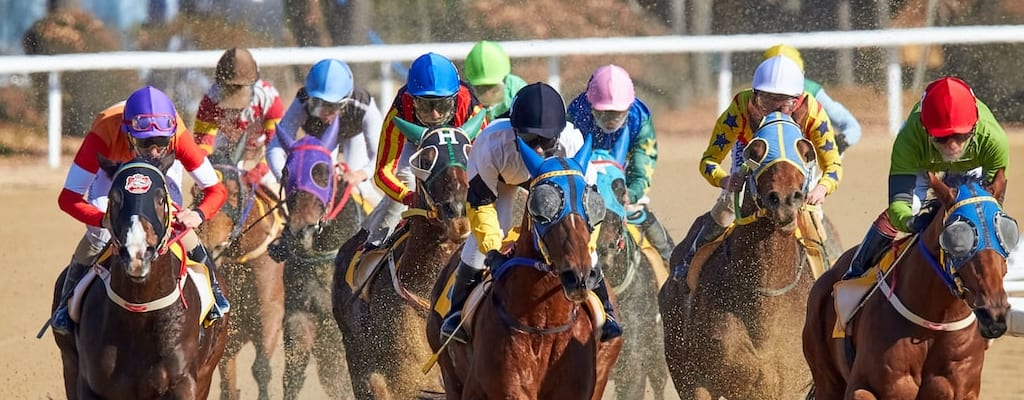horses for courses: Idiom Meaning and Origin
What does ‘horses for courses’ mean?
The idiom "horses for courses" means that different people or things are suited to different tasks or situations.

Idiom Explorer
The idiom "lend itself to" means that something is suitable or adaptable for a particular purpose or situation.
The idiom "if the shoe fits" means that if something said about someone applies to them, then they should accept it as true.
The idiom "if needs be" means that if it is necessary or required, one is willing to do something, even if it is not preferred or convenient.
The idiom "horsetrading" refers to the practice of negotiating or bargaining in a shrewd or calculated manner, often involving give-and-take, compromise, and strategic maneuvering to achieve a desired outcome.
The idiom "horsetrade" means to bargain or negotiate, especially in a shrewd or calculating manner, in order to achieve a desired outcome. It is often used in the context of making deals or compromises, where both parties seek to gain an advantage.
The idiom "horse's mouth" means getting information directly from the source or from someone who has firsthand knowledge or experience about a particular topic.
The idiom "horse's ass" refers to someone who is foolish, incompetent, or makes a fool of themselves. It is often used to criticize someone's behavior or actions, implying that they are behaving stupidly or in a ridiculous manner.
The idiom "horse of a different color" refers to a situation or topic that is completely distinct or unrelated from the one previously mentioned or discussed. It implies a significant change or shift in focus, often catching people by surprise.
The idiom "horse around" means to engage in playful, often rowdy or foolish behavior. It is used to describe someone who is not taking a situation seriously or wasting time by being silly or disruptive.
Revealing Optimal Match
The idiom "horses for courses" is a popular expression used in English-speaking countries to convey the idea that different people or things are suitable for different situations or tasks. It is believed to have originated in the world of horse racing and has subsequently been applied figuratively in a variety of contexts.
The phrase itself consists of two key components: "horses" and "courses." The term "horses" in this idiom refers to the racehorses, which are the central focus of horse racing events. The word "courses" refers to the specific racecourses or tracks on which these races take place. The idiom suggests that not all horses are equally suited to all courses and vice versa.
While the precise origin of the idiom remains unclear, it is commonly believed to have emerged in the early 19th century. Horse racing was a prominent sport during this time, and racing enthusiasts and bettors would often discuss the different strengths and weaknesses of individual horses and their suitability for specific racecourses. The idiom, in its literal sense, likely emerged as a concise way to convey this notion.
Over time, "horses for courses" has gained popularity beyond the realm of horse racing and has become a proverbial expression used in various contexts. It is often employed to suggest that different individuals, objects, or approaches may be more suited to particular circumstances, tasks, or environments. For example, it may be used in discussions about selecting the right person for a job, choosing the appropriate tool for a task, or even finding the perfect location for a particular event or activity.
The idiom "horses for courses" has become firmly entrenched in the English language, with its metaphorical usage extending far beyond its original racing origins. It serves as a reminder that a one-size-fits-all approach is seldom the most effective or efficient solution in a diverse and complex world. Just as certain horses excel on specific racecourses, different individuals, objects, or strategies may shine in particular situations. Understanding this concept allows us to appreciate the intricacies of suitability and adaptability in various contexts.
One related idiom to "horses for courses" is "horse of a different color." This expression is used to describe something that is distinct or different from the topic or situation at hand. It highlights the idea that not everything can be easily categorized or understood within a single framework. Just as horses come in different colors, people, things, and ideas can vary greatly in their characteristics and suitability for specific tasks or situations.
Another related idiom is "fit the bill." This phrase is used to indicate that someone or something meets the necessary requirements or expectations for a particular role or purpose. It implies that the person or thing in question is a good fit, just as a horse that is well-suited to a specific racecourse. When considering different options or candidates, it is important to evaluate whether they "fit the bill" and possess the necessary qualities or attributes to succeed in the given context.
The idiom "lend itself to" is also related to "horses for courses." This expression is used to describe how well something or someone is suited to a particular purpose or use. It suggests that certain things naturally lend themselves to certain situations or tasks, just as some horses excel on specific racecourses. By understanding what lends itself to a specific situation, we can make better decisions and achieve greater success.
One final related idiom is "for one's particular." This phrase emphasizes the idea that something is intended or suitable for a specific individual or purpose. It underscores the importance of considering individual needs, preferences, and circumstances when making choices, just as horses are chosen for their particular suitability to specific racecourses. When something is "for one's particular," it indicates a tailored or customized fit that takes into account specific requirements or preferences.
While the idiom "horses for courses" encapsulates a significant insight into the complexities of matching individuals or things to specific situations, it also leaves room for further exploration and interpretation. Like many idiomatic expressions, it invites us to consider the nuances and subtleties of human behavior, decision-making, and the dynamic nature of our world. It is a testament to the richness and fluidity of language that such idioms continue to captivate our imaginations and inspire further investigation.
Example usage
Here are three examples of how the idiom "horses for courses" can be used in a sentence:
- John loves playing football, but he's not great at basketball. It just goes to show that different people have different skills and abilities - horses for courses.
- When it comes to choosing a career, it's important to consider your interests and strengths. What works for one person may not work for another - horses for courses.
- Julia and Sarah have completely different tastes in music. Julia enjoys classical melodies, while Sarah prefers electronic beats. It's all about personal preferences - horses for courses.
More "Adaptability" idioms



